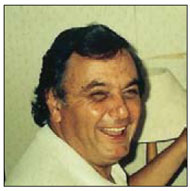Serviços Personalizados
Artigo
Indicadores
Links relacionados
-
 Citado por Google
Citado por Google -
 Similares em Google
Similares em Google
Compartilhar
SAMJ: South African Medical Journal
versão On-line ISSN 2078-5135
versão impressa ISSN 0256-9574
SAMJ, S. Afr. med. j. vol.99 no.5 Pretoria Mai. 2009
SAMJ FORUM
IN MEMORIAM
David Bourne
Rauf Sayed; Margaret Hoffman; Leslie London; Rob Dorrington; Debbie Bradshaw

David Edward Bourne, leading demographer and statistician in the field of HIV in South Africa, died suddenly on 24 February 2009.
David was born on 1 May 1947 in London, UK. He grew up in Durban, South Africa, where he matriculated and majored in applied mathematics at the University of Natal. In 1974 he completed a 2-year postgraduate degree in environmental sciences, population dynamics and applied statistics at the University of the Witwatersrand. In 1975 he switched from an unlikely career in nuclear physics to the University of Cape Town (UCT) as a medical statistician in the Department of Community Medicine. In his 34-year career he became a Chief Research Officer in the Infectious Disease Epidemiology Group in the School of Public Health and Family Medicine, UCT.
David authored over 130 articles, editorials, chapters, letters, reports and debates in the scientific literature. His research covered a vast range of public health fields in South Africa, including economics, mortality and morbidity statistics, distribution of health personnel, climatic impacts on human health, use of racial descriptors in epidemiology, and birth defects. He and colleagues from the MRC's Burden of Disease Research Unit and UCT's Centre for Actuarial Research studied the impact of the HIV epidemic on demographic trends in the country by setting up a rapid mortality surveillance system and contrasting empirical data together with model projections. His recent efforts involved understanding and critiquing the national antenatal HIV survey and he published articles on the subject in the SAMJ.
Putting science ahead of political considerations sometimes resulted in conflict with agencies and officials who were uncomfortable with his research findings. But David was adamant that policy makers should draw from the evidence that he and other colleagues provided, no matter how unpopular such findings were. He ensured that the facts about HIV and its demographic impacts were open to public scrutiny and available for public action. Notwithstanding these difficulties, David served on numerous governmental committees since the 1994 transition, mainly concerning health information and surveillance. He was a member of the International Standards Organisation Technical Committee on Health Informatics.
As a member of the scientific committee of the International Clearinghouse for Birth Defects Monitoring Systems, David and his colleagues pioneered important South African contributions on the decline in the prevalence of neural tube defects after folic acid fortification as a cost-effective primary health care intervention.
Many messages of condolence were received, including: the Treatment Action Campaign, Medical Research Council, Boston University School of Public Health, and international birth defects registries around the globe. A statement on behalf of the Minister of Health at a memorial held by UCT's Faculty of Health Sciences included 'On behalf of the Ministry of Health, I would like to express my deepest sympathy to you all. Just last week David's persistence and perseverance on the 2007 ANC prevalence survey bore some fruit with the Ministry requesting a speedy and co-operative resolution to the many concerns and issues rightfully and constructively raised by David with my offices from December 2008. His persistence has resulted in a multi-stakeholder team being set up to address the concerns he very loudly articulated. It is therefore David's work in the field of HIV/AIDS in South Africa, his contribution to medical science and the role he played as an academic, that cannot go unappreciated and which will always be remembered. His passing is a huge loss to this country and to committed researchers worldwide.' The contrast of these sentiments with the often difficult relationship between the Department and researchers until recently is testimony to David's tireless efforts both to understand and agitate for change.
David's untimely death came as a shock to colleagues for whom he was a good friend and a leading contributor to public health in South Africa over a long and rewarding professional career. His technical understanding and passionate commitment to scientific integrity will be sorely missed.
Our deepest sympathies and sincere condolences go to his wife Lesley and his sons Gerald and Jonathan.














